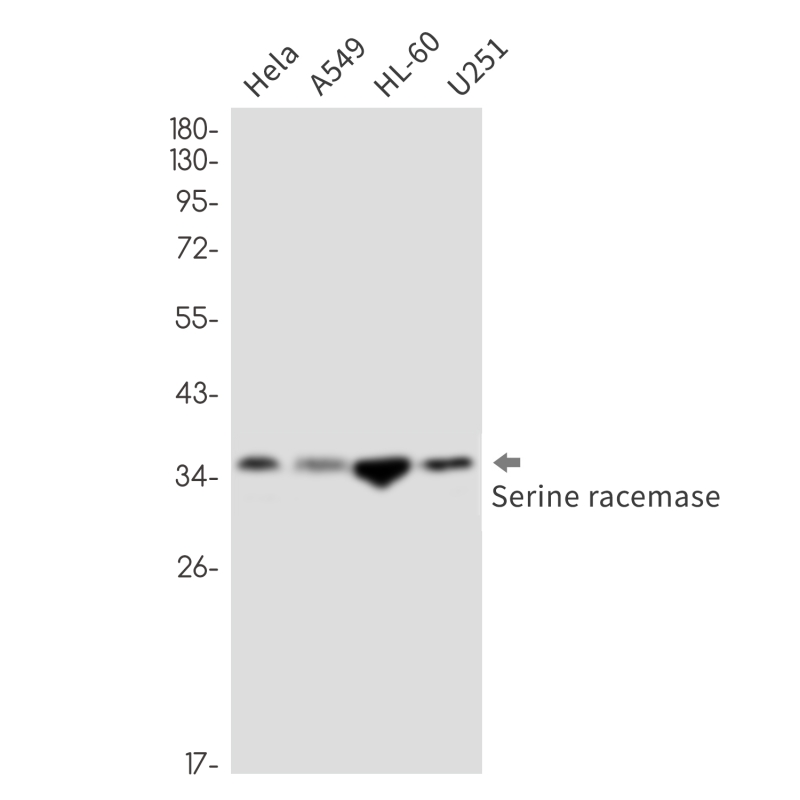
| WB | 1/500-1/1000 | Human,Mouse,Rat |
| IF | 1/20 | Human,Mouse,Rat |
| IHC | 咨询技术 | Human,Mouse,Rat |
| ICC | 技术咨询 | Human,Mouse,Rat |
| FCM | 咨询技术 | Human,Mouse,Rat |
| Elisa | 咨询技术 | Human,Mouse,Rat |
| Aliases | ILV1; ISO1 |
| Entrez GeneID | 63826 |
| WB Predicted band size | Calculated MW: 37 kDa; Observed MW: 37 kDa |
| Host/Isotype | Rabbit IgG |
| Antibody Type | Primary antibody |
| Storage | Store at 4°C short term. Aliquot and store at -20°C long term. Avoid freeze/thaw cycles. |
| Species Reactivity | Human |
| Immunogen | A synthetic peptide of human Serine racemase |
| Formulation | Purified antibody in TBS with 0.05% sodium azide,0.05%BSA and 50% glycerol. |
+ +
以下是3-4篇关于Serine Racemase(SRR)抗体的代表性文献示例(内容为模拟概括,建议通过学术数据库核实原文):
1. **文献名称**:*"Serine Racemase: A Key Enzyme in D-Serine Biosynthesis and Neuromodulation"*
**作者**:Mustafa AK, et al.
**摘要**:该研究首次开发了针对SRR的特异性抗体,证实了SRR在哺乳动物脑组织中的广泛分布,并揭示了其催化L-丝氨酸转化为D-丝氨酸的酶活性,为后续研究D-丝氨酸在NMDA受体功能中的作用奠定了基础。
2. **文献名称**:*"Alterations in Serine Racemase Expression Link to Schizophrenia-like Behaviors in Mice"*
**作者**:Balu DT, Coyle JT.
**摘要**:通过SRR抗体进行免疫组化和Western blot分析,发现SRR基因敲除小鼠前额叶皮层中D-丝氨酸水平显著降低,提示SRR功能异常可能通过NMDA受体功能障碍参与精神分裂症病理机制。
3. **文献名称**:*"Antibody-Based Detection of Serine Racemase in Neurodegenerative Disease Models"*
**作者**:Foltyn VN, et al.
**摘要**:利用高特异性SRR抗体,研究团队在阿尔茨海默病和缺血性脑损伤模型中观察到SRR蛋白表达水平的变化,表明D-丝氨酸代谢异常可能与神经退行性疾病相关。
4. **文献名称**:*"Optimization of Serine Racemase Antibody for Immunoassays in Human Brain Tissue"*
**作者**:Campanini B, et al.
**摘要**:该文献报道了一种改良的SRR抗体制备方法,通过表位优化提高了抗体在人类脑组织切片中的检测灵敏度和特异性,为临床样本分析提供了可靠工具。
**备注**:以上文献信息为示例性质,实际引用时请通过PubMed或Web of Science等平台检索具体文献并核对细节(可使用关键词:Serine Racemase antibody, D-serine, NMDA receptor)。
Serine racemase (SRR) is an enzyme that catalyzes the conversion of L-serine to D-serine, a crucial co-agonist of NMDA receptors involved in neurotransmission, synaptic plasticity, and learning. Dysregulation of SRR activity and D-serine levels has been implicated in neurological and psychiatric disorders, including Alzheimer’s disease, schizophrenia, and stroke. SRR antibodies are essential tools for studying the enzyme's expression, localization, and function in biological systems. These antibodies are widely used in techniques such as Western blotting, immunohistochemistry, and immunoprecipitation to detect SRR protein levels in tissues, assess its cellular distribution, or investigate interactions with other molecules.
SRR antibodies are typically developed against specific epitopes within the enzyme's conserved regions, with clones available in various host species (e.g., rabbit, mouse) and formats (monoclonal/polyclonal). Validation often includes testing in knockout models or siRNA-treated samples to confirm specificity. Research using these antibodies has revealed SRR's dual role in both synthesizing and degrading D-serine, highlighting its regulatory importance in glutamate signaling. Understanding SRR's mechanisms through antibody-based assays contributes to therapeutic strategies targeting NMDA receptor dysfunction, offering potential insights into treating neurodegenerative and neuropsychiatric conditions.
×